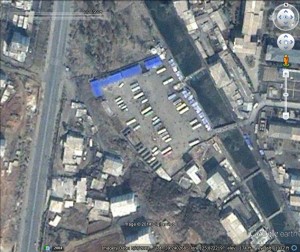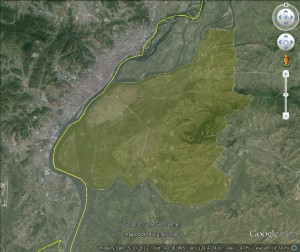UPDATE 4 (2014-3-17): US Navy Seals have boarded the Morning Glory.According to the BBC:
The raid by Navy Seals took place in international waters south of Cyprus, said spokesman Rear Adm John Kirby.
The Morning Glory’s evasion of a naval blockade at the eastern port of Sidra prompted Libya’s parliament to sack Prime Minister Ali Zeidan last week.
The oil terminal has been under the control of militia wanting autonomy for eastern Libya since July 2013.
Meanwhile, there has been a deadly attack on the barracks in the main eastern city of Benghazi.
This was their first attempt to export oil from rebel-held areas. It is not clear where the tanker was headed.
Adm Kirby said the operation had been authorised by President Barack Obama and that no-one had been hurt.
“The Morning Glory is carrying a cargo of oil owned by the Libyan government National Oil Company. The ship and its cargo were illicitly obtained,” he said, adding that it would now be returned to a Libyan port.
The vessel was flagged in North Korea but officials in Pyongyang said it had been deregistered because of the incident.
It was said to have been operated by an Egyptian company.
More in the Washington Post here.
See Marcus Noland’s comments here.
UPDATE 3 (2014-3-13): Morning Glory is on the run! According to The Diplomat:
…The Libyan government didn’t take kindly to this and threatened to attack the tanker, threatening airstrikes against it. Eventually, the tanker was intercepted and taken to Misrata where it was held by Libyan warships.
Remarkably, the North Korean tanker managed to escape its capture by the Libyan fleet in the middle of the night. It made its escape when the weather forced the smaller Libyan warships and patrol boats to sail close to the coast, leaving a gap in the convoy guarding the tanker. The Morning Glory made a run for the open seas and is now confirmed to be back in international waters according to Mohammad Hitab a spokesman for Libya’s al-Waha Oil Company, the state-run company running the Es Sider port.
It remains unknown the extent to which North Korea is communicating with Libya’s federalist rebels. In the case of the oil sale, the rebels were looking for buyers willing to purchase risky oil at rates far below the asking market price. Given North Korea’s energy situation, it appeared to be one of the few buyers interested in the deal. A report from the Libya Herald earlier this week noted that members of the federalist rebels were spotted on board the Morning Glory prior to its attempted departure from Es Sider port.
The tanker’s escape resulted in a no confidence vote on Prime Minister Ali Zeidan’s leadership in Libya. Zeidan lost the vote and had his travel barred. Libyan Defense Minister Abdallah al-Thinni was sworn in on Tuesday evening, according to Reuters.
The United States Department of State issued a statement where it said it was “deeply concerned by reports that a vessel sailing under the name Morning Glory is loading a cargo of illicitly obtained oil at the Libyan port of As-Sidra.” The statement does not mention North Korea but notes that the Morning Glory‘s ”action is counter to law and amounts to theft from the Libyan people.” The Italian Navy had reportedly assisted the Libyans in intercepting the Morning Glory but has since withdrawn from attempting to prevent the ship from leaving the Mediterranean.
UPDATE 2 (2014-3-12): Here is the full statement from KCNA on the tanker:
Spokesman for Maritime Administration of DPRK on “Oil Tanker Incident” in Libya
Pyongyang, March 12 (KCNA) — A spokesman for the Maritime Administration of the DPRK Wednesday gave the following answer to the question raised by KCNA in connection with the recent DPRK-flagged “oil tanker incident” which occurred in Libya:
On March 8 the government of Libya informed the DPRK of the fact that the DPRK-flagged oil tanker Morning Glory made an oil contract with an individual armed group in Libya and illegally entered a port under the control of the group in the eastern part of Libya, and urged the DPRK to take a necessary measure for settling it through a formal channel.
As far as the oil tanker is concerned, it is a ship run by the Golden East Logistics Company in Alexandria, Egypt and is allowed to temporarily use the DPRK flag for six months in accordance with the contract made by the company with the DPRK at the end of February.
Right after being informed of the fact by the Libyan side, the DPRK strongly blamed the company side for the violation of the contract and demanded it let the ship leave the port at once without loading oil.
In addition to it, the DPRK formally notified the Libyan government and the International Maritime Organization that it cancelled and deleted the ship’s DPRK registry and invalidated all the certificates as the ship violated the DPRK’s law on the registry of ships and the contract that prohibited it from transporting contraband cargo and entering the warring, dispute-torn or natural disaster-affected areas.
Therefore, the ship has nothing to do with the DPRK at present and it has no responsibility whatsoever as regards the ship.
What matters is that some foreign media are making much fuss, deliberately linking the case with the DPRK, claiming that “the north Korean ship tried to purchase oil from Libya in an illegal manner” and “the government force of Libya opened fire on the north Korean flagged oil tanker.”
Some forces are misleading the public opinion, persistently linking the issue with the DPRK. This is obviously aimed at achieving a sinister political purpose to tarnish its image.
They should clearly know that with neither false propaganda nor mud-slinging can they damage the image of the dignified DPRK.
The AP reports on proof the DPRK provided to the western media to back up its claims:
North Korea offers its flag to foreign-owned ships in the same way as a number of other countries do.
Jon provided a document he said was the official deletion of the Morning Glory from the Maritime Administration’s registry. He also showed email correspondence he said was from IHS Maritime in London, a company that manages shipping information, that purportedly acknowledged the deletion of a vessel from the North Korean registry.
UPDATE 1 (2014-3-12): The DPRK has denied it owns the ship. According to the Wall Street Journal:
North Korea denied on Thursday it was illegally exporting oil from rebel-controlled eastern Libya, claiming that an Egyptian company was operating a North Korean flagged oil tanker in the center of an armed standoff since Saturday.
North Korea said it had revoked the registry of the tanker, named “Morning Glory,” and demanded that Alexandria-based Golden East Logistics Company leave al-Sidra port without loading oil.
The tanker, carrying at least 234,000 barrels of crude oil, sailed from a rebel-controlled port into international waters on Tuesday.
A contract signed by North Korea with the Egyptian company prohibits the tanker from transporting contraband cargo and entering war or disaster zones, North Korea said through a report in its state media.
“The ship has nothing to do with the DPRK at present and it (North Korea) has no responsibility whatsoever as regards the ship,” the report said, using the abbreviation of country’s official name Democratic People’s Republic of Korea.
The Golden East Logistics Company couldn’t be immediately reached for comment.
The presence of a North Korean-flagged vessel in the Mediterranean is very unusual, although the country has been involved in trading arms in the region. Cheong Seong-chang, a senior analyst at Seoul-based think tank Sejong Institute, said the rebels may have offered oil to North Korea at a fraction of market prices.
ORIGINAL POST (2014-3-6): According to IBT:
A North Korean oil tanker has tried to dock at Libya’s Es-Sider port which has been seized by armed protesters, Reuters reports.
It has not yet been confirmed whether the tanker wanted to take oil from the protesters, who have threatened to sell it independently unless they get political autonomy from Tripoli and a greater share of oil revenues, according to Libyan officials.
“The tanker came to Es-Sider but did not load oil,” said an official at the state-owned Waha Oil Co, which operates the port and connecting oilfields.
An official at National Oil Corp (NOC), which owns Waha, said he did not know whether the protesters, led by former militia leader Ibrahim Jathran, had tried to attract buyers with the tanker but said: “We know they have been trying to sell oil.”
It is extremely unusual for a North Korean-flagged oil tanker to operate in the Mediterranean region, shipping sources said.
Jathran’s group seized three oil ports which accounted for 600,000 barrels per day of export, before the protests started in 2013.
The Libyan government has tried to end the protests but little progress has been made so far.
Libya’s defence minister held talks with protesters blocking the 340,000-bpd El Sharara oilfield in the south, but NOC has not confirmed whether it will reopen in the near future.
The strikers are also demanding national identity cards and a local council; the ministers have promised to meet the requests.
Jathran’s group declined to comment.
The Libyan navy fired on a Maltese-flagged tanker which allegedly tried to load oil from the protesters in the port in January.
Libya’s oil output has fallen to little over 200,000 bpd from 1.4 million bpd in July when protests started across the country.
“The financial situation of the government is difficult,” Culture Minister Habib al-Amin, who acts as a government spokesman, said in February.
“Some ministries have been unable to pay for expenditures due to a lack of budget and liquidity.”
Read the full story here:
Libya: North Korea Oil Tanker Tries to Dock at Seized Es-Sider Oil Port
International Business Times
Ludovica Iaccino
2014-3-6


